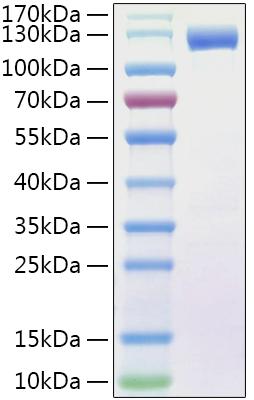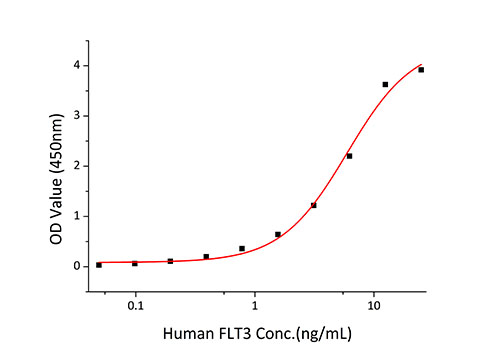Recombinant Human FLT-3/FLK-2/CD135 Protein (RPCB0878)
- SKU:
- RPCB0878
- Size:
- 10µg
- Tag:
- C-hFC&His
- Reactivity:
- Human
- Expression Host:
- HEK293 cells
Description
| Product Name: | Recombinant Human FLT-3/FLK-2/CD135 Protein |
| SKU: | RPCB0878 |
| Size: | 10µg |
| Tag: | C-hFC&His |
| Reactivity: | Human |
| Expression Host: | HEK293 cells |
| Protein Description: | High quality, high purity and low endotoxin recombinant Recombinant Human FLT-3/FLK-2/CD135 Protein , tested reactivity in HEK293 cells and has been validated in SDS-PAGE.100% guaranteed. |
| Endotoxin: | < 1.0 EU/μg of the protein by LAL method. |
| Purity: | > 95% by SDS-PAGE. |
| Formulation: | Lyophilized from a 0.22 μm filtered solution of PBS, pH 7.4. |
| Gene ID: | 2322 |
The cluster of differentiation (CD) system is commonly used as cell markers in Immunophenotyping. Different kinds of cells in the immune system can be identified through the surface CD molecules which associating with the immune function of the cell. There are more than 320 CD unique clusters and subclusters have been identified. Some of the CD molecules serve as receptors or ligands important to the cell through initiating a signal cascade which then alter the behavior of the cell. Some CD proteins do not take part in cell signal process but have other functions such as cell adhesion. CD135, also known as FLT-3, FLK-2, is a member of the CD system. CD135 is an important cell surface marker recognized by specific sets of antibodies to identify the types of hematopoietic (blood) progenitors in the bone marrow and it function to differentiate hematopoietic stem cells, which are CD135 negative, from multipotent progenitors, which are CD135 positive. CD135 is a receptor tyrosine kinase typeⅢ for the cytokine Flt3 ligand and activat signaling through second messengers by binding to Flt3. Signaling through CD135 is important for lymphocyte development. The encoding gene CD135 is a proto-oncogene to which mutations happened will lead to cancer such as leukemia.
| Storage: | Store at -20℃.Store the lyophilized protein at -20℃ to -80 ℃ up to 1 year from the date of receipt.After reconstitution, the protein solution is stable at -20℃ for 3 months, at 2-8℃ for up to 1 week. |
| Reconstitution: | Centrifuge the vial before opening. Reconstitute to a concentration of 0.1-0.5 mg/mL in sterile distilled water. Avoid vortex or vigorously pipetting the protein. For long term storage, it is recommended to add a carrier protein or stablizer (e.g. 0.1% BSA, 5% HSA, 10% FBS or 5% Trehalose), and aliquot the reconstituted protein solution to minimize free-thaw cycles. |
| Swiss-Prot: | P36888 |








